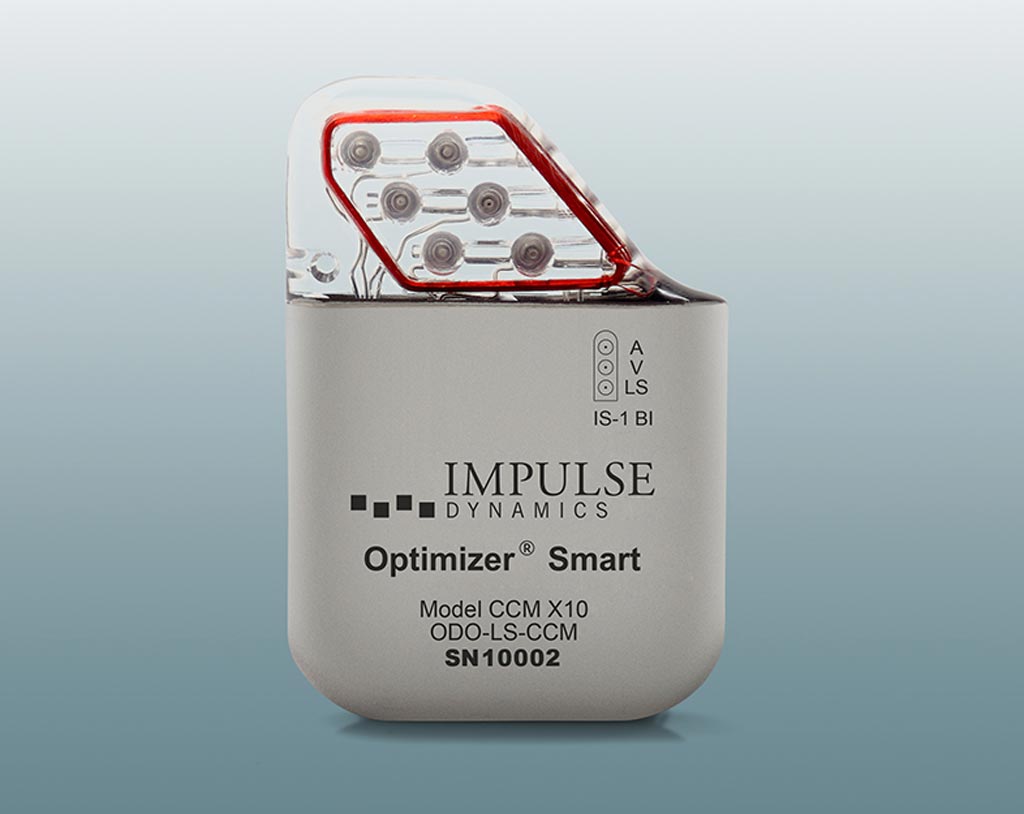Implantable System Modulates Cardiac Contractions
|
By HospiMedica International staff writers Posted on 02 Apr 2019 |

Image: The Optimizer Smart implantable device (Photo courtesy of Impulse Dynamics).
A novel device delivers non-excitatory electrical pulses to improve systolic contractions in severe and chronic heart failure (HF) patients.
The Impulse Dynamics (Stuttgart, Germany) Optimizer Smart implantable device works by delivering cardiac contractility modulation (CCM) signals to the heart muscle during the absolute refractory period (just after the heart’s excitation), initiating biochemical and neurohormonal changes in the myocardium. As a result, the myocardium contracts more, with no associated increase in oxygen consumption, enabling the heart to operate more efficiently. The target population includes HF patients with a reduced ejection fraction who are in normal sinus rhythm, and are not indicated for a cardiac resynchronization therapy (CRT) device.
The system includes an implantable pulse generator (IPG) unit that both senses the heart’s electrical activity and delivers CCM signals via two electrodes placed in the right ventricle. The IPG is recharged (without supervision) weekly using a home-based charger that also provides instructions and feedback to the patient on the charging process. A portable programmer allows medical personnel to customize and optimize signal parameters according to individual patient needs, with dynamic evaluations made using the patient’s electrocardiogram (ECG) and marker channels.
”CCM technology meets a major need globally, and we are committed to demonstrating the value of CCM therapy to healthcare systems worldwide to benefit more patients with heart failure,” said Simos Kedikoglou, MD, CEO of Impulse Dynamics. “We are extremely excited that the Optimizer Smart System with CCM therapy is now available in the United States. We look forward to growing our commercial presence in the US and globally.”
“We finally have available an effective device-based therapy for advanced heart failure patients with mildly to moderately reduced left ventricular ejection fractions who are not eligible for CRT,” said Professor William Abraham, MD, of Ohio State University (OSU, Columbus, USA). “The Optimizer System, along with guideline-directed medical therapies, can improve the lives of many heart failure patients in the US who previously did not have access to this therapy. As such, it represents a real game-changer for these patients.”
Related Links:
Impulse Dynamics
The Impulse Dynamics (Stuttgart, Germany) Optimizer Smart implantable device works by delivering cardiac contractility modulation (CCM) signals to the heart muscle during the absolute refractory period (just after the heart’s excitation), initiating biochemical and neurohormonal changes in the myocardium. As a result, the myocardium contracts more, with no associated increase in oxygen consumption, enabling the heart to operate more efficiently. The target population includes HF patients with a reduced ejection fraction who are in normal sinus rhythm, and are not indicated for a cardiac resynchronization therapy (CRT) device.
The system includes an implantable pulse generator (IPG) unit that both senses the heart’s electrical activity and delivers CCM signals via two electrodes placed in the right ventricle. The IPG is recharged (without supervision) weekly using a home-based charger that also provides instructions and feedback to the patient on the charging process. A portable programmer allows medical personnel to customize and optimize signal parameters according to individual patient needs, with dynamic evaluations made using the patient’s electrocardiogram (ECG) and marker channels.
”CCM technology meets a major need globally, and we are committed to demonstrating the value of CCM therapy to healthcare systems worldwide to benefit more patients with heart failure,” said Simos Kedikoglou, MD, CEO of Impulse Dynamics. “We are extremely excited that the Optimizer Smart System with CCM therapy is now available in the United States. We look forward to growing our commercial presence in the US and globally.”
“We finally have available an effective device-based therapy for advanced heart failure patients with mildly to moderately reduced left ventricular ejection fractions who are not eligible for CRT,” said Professor William Abraham, MD, of Ohio State University (OSU, Columbus, USA). “The Optimizer System, along with guideline-directed medical therapies, can improve the lives of many heart failure patients in the US who previously did not have access to this therapy. As such, it represents a real game-changer for these patients.”
Related Links:
Impulse Dynamics
Latest Critical Care News
- Wheeze-Counting Wearable Device Monitors Patient's Breathing In Real Time
- Wearable Multiplex Biosensors Could Revolutionize COPD Management
- New Low-Energy Defibrillation Method Controls Cardiac Arrhythmias
- New Machine Learning Models Help Predict Heart Disease Risk in Women
- Deep-Learning Model Predicts Arrhythmia 30 Minutes before Onset
- Breakthrough Technology Combines Detection and Treatment of Nerve-Related Disorders in Single Procedure
- Plasma Irradiation Promotes Faster Bone Healing
- New Device Treats Acute Kidney Injury from Sepsis
- Study Confirms Safety of DCB-Only Strategy for Treating De Novo Left Main Coronary Artery Disease
- Revascularization Improves Quality of Life for Patients with Chronic Limb Threatening Ischemia
- AI-Driven Prediction Models Accurately Predict Critical Care Patient Deterioration
- Preventive PCI for High-Risk Coronary Plaques Reduces Cardiac Events
- AI Diagnostic Tool Guides Rapid Diagnosis and Prediction of Sepsis
- World's First AI-Powered Sepsis Alert System Detects Sepsis in One Minute
- Smartphone Magnetometer Uses Magnetized Hydrogel to Measure Biomarkers for Disease Diagnosis
- New Technology to Revolutionize Valvular Heart Disease Care
Channels
Artificial Intelligence
view channel
AI-Powered Algorithm to Revolutionize Detection of Atrial Fibrillation
Atrial fibrillation (AFib), a condition characterized by an irregular and often rapid heart rate, is linked to increased risks of stroke and heart failure. This is because the irregular heartbeat in AFib... Read more
AI Diagnostic Tool Accurately Detects Valvular Disorders Often Missed by Doctors
Doctors generally use stethoscopes to listen for the characteristic lub-dub sounds made by heart valves opening and closing. They also listen for less prominent sounds that indicate problems with these valves.... Read moreSurgical Techniques
view channel
Flexible Microdisplay Visualizes Brain Activity in Real-Time To Guide Neurosurgeons
During brain surgery, neurosurgeons need to identify and preserve regions responsible for critical functions while removing harmful tissue. Traditionally, neurosurgeons rely on a team of electrophysiologists,... Read more.jpg)
Next-Gen Computer Assisted Vacuum Thrombectomy Technology Rapidly Removes Blood Clots
Pulmonary embolism (PE) occurs when a blood clot blocks one of the arteries in the lungs. Often, these clots originate from the leg or another part of the body, a condition known as deep vein thrombosis,... Read more
Hydrogel-Based Miniaturized Electric Generators to Power Biomedical Devices
The development of engineered devices that can harvest and convert the mechanical motion of the human body into electricity is essential for powering bioelectronic devices. This mechanoelectrical energy... Read moreWearable Technology Monitors and Analyzes Surgeons' Posture during Long Surgical Procedures
The physical strain associated with the static postures maintained by neurosurgeons during long operations can lead to fatigue and musculoskeletal problems. An objective assessment of surgical ergonomics... Read morePatient Care
view channel
Surgical Capacity Optimization Solution Helps Hospitals Boost OR Utilization
An innovative solution has the capability to transform surgical capacity utilization by targeting the root cause of surgical block time inefficiencies. Fujitsu Limited’s (Tokyo, Japan) Surgical Capacity... Read more
Game-Changing Innovation in Surgical Instrument Sterilization Significantly Improves OR Throughput
A groundbreaking innovation enables hospitals to significantly improve instrument processing time and throughput in operating rooms (ORs) and sterile processing departments. Turbett Surgical, Inc.... Read more
Next Gen ICU Bed to Help Address Complex Critical Care Needs
As the critical care environment becomes increasingly demanding and complex due to evolving hospital needs, there is a pressing requirement for innovations that can facilitate patient recovery.... Read moreGroundbreaking AI-Powered UV-C Disinfection Technology Redefines Infection Control Landscape
Healthcare-associated infection (HCAI) is a widespread complication in healthcare management, posing a significant health risk due to its potential to increase patient morbidity and mortality, prolong... Read moreHealth IT
view channel
Machine Learning Model Improves Mortality Risk Prediction for Cardiac Surgery Patients
Machine learning algorithms have been deployed to create predictive models in various medical fields, with some demonstrating improved outcomes compared to their standard-of-care counterparts.... Read more
Strategic Collaboration to Develop and Integrate Generative AI into Healthcare
Top industry experts have underscored the immediate requirement for healthcare systems and hospitals to respond to severe cost and margin pressures. Close to half of U.S. hospitals ended 2022 in the red... Read more
AI-Enabled Operating Rooms Solution Helps Hospitals Maximize Utilization and Unlock Capacity
For healthcare organizations, optimizing operating room (OR) utilization during prime time hours is a complex challenge. Surgeons and clinics face difficulties in finding available slots for booking cases,... Read more
AI Predicts Pancreatic Cancer Three Years before Diagnosis from Patients’ Medical Records
Screening for common cancers like breast, cervix, and prostate cancer relies on relatively simple and highly effective techniques, such as mammograms, Pap smears, and blood tests. These methods have revolutionized... Read morePoint of Care
view channel
Critical Bleeding Management System to Help Hospitals Further Standardize Viscoelastic Testing
Surgical procedures are often accompanied by significant blood loss and the subsequent high likelihood of the need for allogeneic blood transfusions. These transfusions, while critical, are linked to various... Read more
Point of Care HIV Test Enables Early Infection Diagnosis for Infants
Early diagnosis and initiation of treatment are crucial for the survival of infants infected with HIV (human immunodeficiency virus). Without treatment, approximately 50% of infants who acquire HIV during... Read more
Whole Blood Rapid Test Aids Assessment of Concussion at Patient's Bedside
In the United States annually, approximately five million individuals seek emergency department care for traumatic brain injuries (TBIs), yet over half of those suspecting a concussion may never get it checked.... Read more
New Generation Glucose Hospital Meter System Ensures Accurate, Interference-Free and Safe Use
A new generation glucose hospital meter system now comes with several features that make hospital glucose testing easier and more secure while continuing to offer accuracy, freedom from interference, and... Read moreBusiness
view channel
Johnson & Johnson Acquires Cardiovascular Medical Device Company Shockwave Medical
Johnson & Johnson (New Brunswick, N.J., USA) and Shockwave Medical (Santa Clara, CA, USA) have entered into a definitive agreement under which Johnson & Johnson will acquire all of Shockwave’s... Read more














